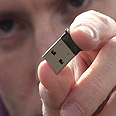
International efforts to target terrorist misuse of the Internet must be better coordinated, experts said Thursday.
The experts made their comments on the sidelines of a closed-door meeting at the Vienna-based Organization for Security and Cooperation in Europe. The meeting was intended to identify new approaches for fighting the use of the Web for terrorist purposes. About 100 specialists from 40 countries are expected to attend the two-day gathering, which began Thursday afternoon.
''Unfortunately, there is not a coherent strategy in Europe, especially among the 27 European Union member nations, as to what to do,'' said Sajjan Gohel, director for international security at the London-based Asia-Pacific Foundation.
''There's a lot of good talking, a lot of fine words, but those need to backed up with fine deeds,'' he said.
Gabriel Weimann, a professor of communication at Israel's Haifa University and a former research fellow at the United States Institute of Peace, said counterterrorism efforts on the Web also needed to become more sophisticated. The measures taken should depend on the organization and Web site in question, he said.
''Some have to be kept, monitored and learned from. Some have to be blocked,'' Weimann said.
Much could be learned about ''inner debates'' within terrorist groups by monitoring some sites, he said.
Mohamed Bin Ali of the Religious Rehabilitation Group in Singapore said the best way to prevent people from becoming radicalized was education.
''I think that the fight against today's extremism requires a multi-pronged approach... and the government alone cannot win the fight,'' he said. He suggested the creation of ''counter Web sites.''
Organizers of the meeting acknowledged that more needed to be done to create a global strategy for targeting terrorists on the Web.
''People intent on abusing cyberspace for terrorist purposes could do so from virtually anywhere in the world, with a laptop and an Internet connection,'' Carlos Sanchez de Boado, the Spanish chairman of the OSCE's Permanent Council, said during the meeting's opening session.
''In order to make a sustained impact on this counterterrorism field, we absolutely have to cooperate very closely and in a coordinated manner,'' he said.
The Internet has featured prominently in recent terrorist threats and attacks.
In Vienna, two men and a woman with suspected contacts to al-Qaida were arrested in September in connection with an online video threat against Austria and Germany that surfaced in March. One of the three has since been released. A fourth person was arrested in Canada in connection with the threat.















